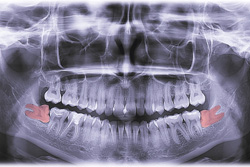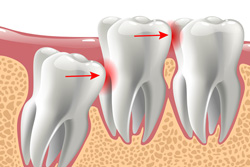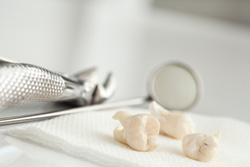Wisdom Tooth Extraction Syracuse
When Third Molar Removal Is Wise and Necessary

Whether you are an older teen or young adult now or remember being one yourself as your child is entering this phase, this age group thinks they know everything and frequently don’t want to fix dental problems if they can avoid it, especially if they don’t feel pain yet. However, when it comes to wisdom teeth, a preventive, early extraction might be the best course of action to protect the rest of your teeth. Do you need to have your wisdom teeth extracted? Contact us for a consultation today!
What are Wisdom Teeth?

Over the course of human history, our species has changed, and features that once were essential to our survival have become superfluous. At one point, the appendix must have performed some task or function, but researchers still aren’t sure what. Likewise, humans used to need extra teeth! Did you know that most—but not all—people still develop three sets of molars? The final set typically arrives between a person’s late teenage years and their early 20s—a phase in life when people are considered to transition from kids to adults.
Why Do Wisdom Teeth Need to Be Removed?

Although our ancient ancestors often needed this third set of molars to replace lost teeth early on and to help with chewing tougher foods, modern diets and smaller mouths make wisdom teeth unnecessary. In fact, because of better oral hygiene and shrinking oral cavity sizes, they can even put the rest of your smile at a much higher risk of damage, infection, alignment shifting, and pain. When your mouth is unable to make space for them, removing wisdom teeth before they start to cause harm preserves your teeth for the rest of your adult life.
What to Expect from the Wisdom Teeth Procedure

Most of the time, wisdom teeth are still submerged in the gums, which means the extraction requires very minor surgery. After your mouth has been completely numbed with a local anesthetic, a small incision gives us access to these teeth, and if they are simple, we can manage to remove them with little effort and close the gum tissue with stitches. If you have a more complex case, we will kindly refer you to a trusted local expert in these types of procedures, practically guaranteeing the success of your extraction.
Recovering from Wisdom Teeth Extraction

The vast majority of wisdom teeth are extracted when they are still below the gum surface, as a result, the recovery can be a little more intensive than a simple extraction with dental pliers. Like any other tooth extraction, you’ll need to protect the surgical area and allow a blood clot to form over it. This clot shields the tender tissues and nerves underneath from bacteria. As a result, here are some things you need to do (and not do) to ensure smooth healing:
- Keep clean gauze on the site until bleeding stops.
- Get lots of rest, and don’t engage in physical activities for a couple of days, including physical work.
- Drink plenty of water, but do not use a straw for at least 48 hours after the procedure.
- Eat soft foods like mashed potatoes, applesauce, eggs, pasta, yogurt, and the like for at least several days, and then you can slowly build back up to a normal diet.
